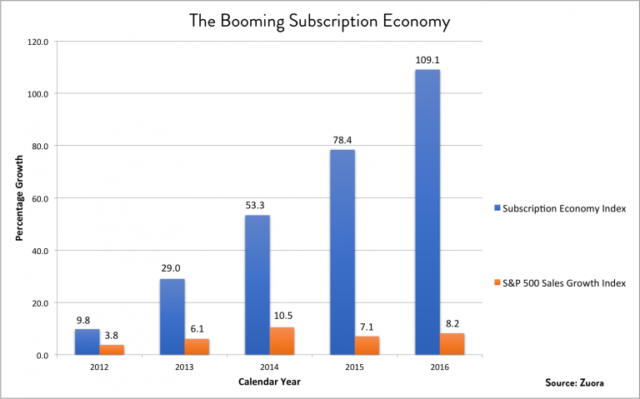By David McCann in CFO.com
If you’re ever awake, you probably know that the subscription-based, recurring-revenue business model is booming. But do you know just how big and loud that boom is?
“Everything is going to move to subscription at some point,” claims Tyler Sloat, CFO of Zuora, a company that offers a comprehensive billing and finance platform for subscription businesses. He does acknowledge that it’s “a very big statement” — but he’s actually not kidding around.
In November Zuora released its Subscription Economy Index (SEI), which tracks the growth of subscription-based companies compared to major indices that measure the performance of the broader economy. The SEI is populated with data on clients’ sales — from the beginning of 2012 to the present — that flow through Zuora’s platform.
Are you ready for this? In the almost five-year time frame monitored by the SEI, the “subscription economy,” if you will, has grown 900% faster than sales per share among S&P 500 companies, 420% faster than U.S. retail sales, and 500% faster than the U.S. economy.
Another way to look at the comparisons: the SEI has grown at an average annual rate of 15.1% since Jan. 1, 2012, compared with 3.6% for U.S. retail sales and 1.7% for S&P sales per share.

About 350 Zuora clients currently are included in the SEI, making the index statistically significant and a good proxy for the entire subscription economy, according to Sloat.
Of course, a huge number of subscription-based businesses have been launched in recent years, and the ones that have survived are naturally in more of a growth mode than is typically the case for the mature companies that comprise a majority of the S&P 500.
To at least partly counteract that effect, no company is admitted into the SEI until it’s been running on Zuora’s platform for two years. For companies that have a subscription model for a portion of their business and a traditional model for the rest, only the subscription portion is included in the index.
Zuora, a subscription business itself, has several competitors, but in late 2015 Forrester Research rated the company as having both the strongest strategy and most current offering among subscription billing platforms. Aria Systems was a close second in both categories.
A Proven Business Model
The promise of a subscription business is that it will generate recurring revenue from customers rather than making one-off sales. For its part, Zuora has a fairly expansive definition of “subscription.”
“It’s about the relationship with the customer and transactions happening on a platform,” Sloat says. You may simply buy a series of one-time items from Amazon, for example, but Amazon is tracking everything you buy, directing your attention to related or similar products, making special offers based on your buying history, and giving you free shipping if you have an Amazon Prime account.
“The way we think about subscriptions, that’s a subscription relationship,” says Sloat.
Media and telecommunications companies, of course, have long relied on the subscription model, and the field of software-as-a-service subscription businesses has been exploding for years now. And, of course, the services sector, which has surged to the forefront of commerce in recent decades, is tailor-made for subscription offerings.
But Zuora was founded in 2007 on the premise that not only companies in such industries, and not only startups, but virtually every company would eventually move to a subscription-based, recurring-revenue model for at least a part of its business.
That evolution has already begun, and not in a small way. There are seemingly endless examples of companies, including manufacturers, offering new subscription services, in many cases powered by Internet of things technologies.
General Motors’ OnStar service was an early forerunner when it launched in 1996. Twenty years later, “the connected car” is among the hottest subscription-based commercial concepts around, with GM, Ford, and other manufacturers offering a wide range of connected services.
Some more examples:
- France-based Tarkett, which has been providing flooring and surface solutions for 130 years, recently introduced its FloorInMotion service for aged-care facilities. The subscription service is based on connected flooring, allowing facility personnel to know when a resident has fallen or exhibits certain problematic behaviors such as making an unusually large number of trips to the bathroom.
- Camera maker GoPro has a new product line that can auto-upload photos and videos to a cloud-based subscription service designed to ease the access to, editing of, and sharing of such content.
- Schneider Electric, a French multinational company specializing in energy management and automation, is a Zuora client that’s now offering subscription services. “Instead of selling a big HVAC system to a building and monetizing it once except for maybe some maintenance revenue, [Schneider] can charge per month” for power and energy management services “that optimize efficiency in the usage of energy,” says Sloat.
Download the Subscription Economy Index™ here and check out some of Zuora’s customers here!